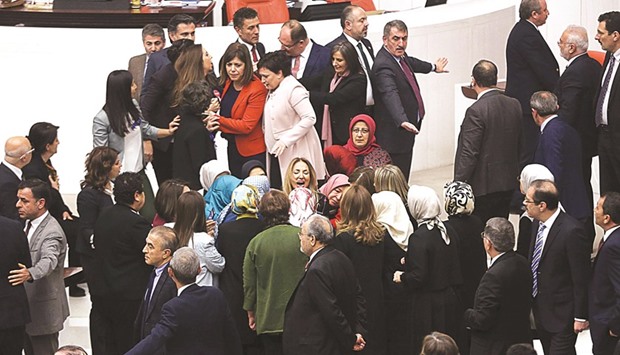Erdogan, who could rule the European Union candidate country until 2029 if the legislation is passed, says it will provide stability at a time of turmoil and prevent a return to the fragile coalitions of the past.
During the evening debate an independent lawmaker, Aylin Nazliaka, handcuffed herself to the podium in protest against the stronger presidency, triggering a scuffle between MPs of the ruling AK Party and opposition parties.
At least two MPs were injured in the scuffle, reports said.
Pictures showed the two women being carried away on stretchers from the parliament, which is debating a second reading of the controversial bill.
Nazliaka had declared: “I am chaining myself to the lectern to say no to the diktat of one man, to oppose the annulment of republican values and protest against parliament being handcuffed with this constitutional revision.”
AKP deputies tried to remove her, but MPs from the opposition HDP and Republican People’s Party (CHP) sprang to her defence, and punches and kicks were exchanged, according to Turkish media.
One CHP deputy in a wheelchair, Safak Pavey, who has a prosthetic arm and leg, was thrown to the floor before being helped out by her colleagues, the Hurriyet daily reported.
“They attacked us, it was like they lost their heads. This attack shows what awaits us once the (reform of) the constitution is passed,” said Pavey, cited by the newspaper.
The proposed changes, which will create an executive presidency for the first time in modern Turkey, are controversial and far-reaching.
The president will have the power to appoint and fire ministers, while the post of prime minister will be abolished for the first time in Turkey’s history and replaced by single or multiple vice-presidents.
Erdogan’s supporters say the plans would simply bring Turkey into line with countries like France or the United States, and are necessary for effective government and to avoid the need for fragile coalition governments.
With the adoption of the latest four articles overnight, the assembly has now approved 11 articles in the second round of voting.
It is on track to pass the remaining seven articles and vote on the package as a whole.
Providing it garners the support of at least 330 deputies in the 550-member assembly in the remaining votes, the legislation will go to a referendum, expected in the spring.
Erdogan assumed the presidency, a largely ceremonial position, in 2014 after more than a decade as prime minister.
Since then, pushing his powers to the limit, he has continued to dominate politics by dint of his personal popularity.
Critics accuse him of increasing authoritarianism with the arrests and dismissal of tens of thousands of judges, police, military officers, journalists and academics since a failed military coup in July.
Erdogan points to a danger from Islamic State and Kurdish militants.

